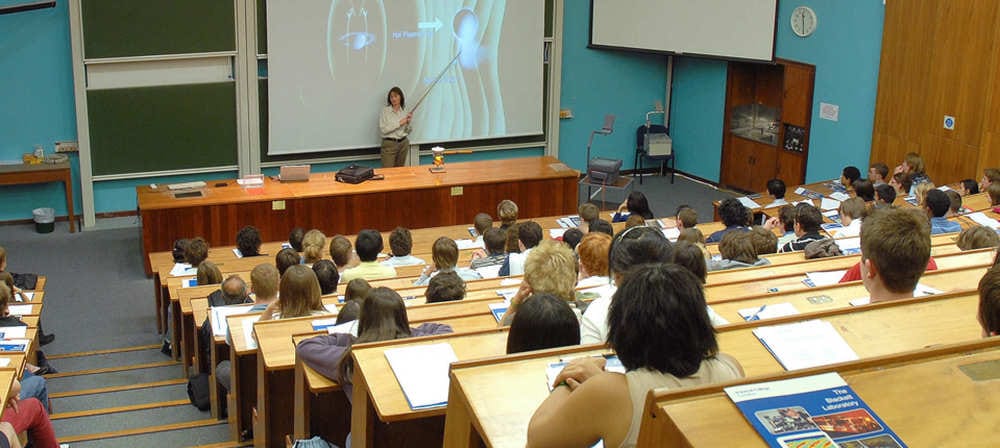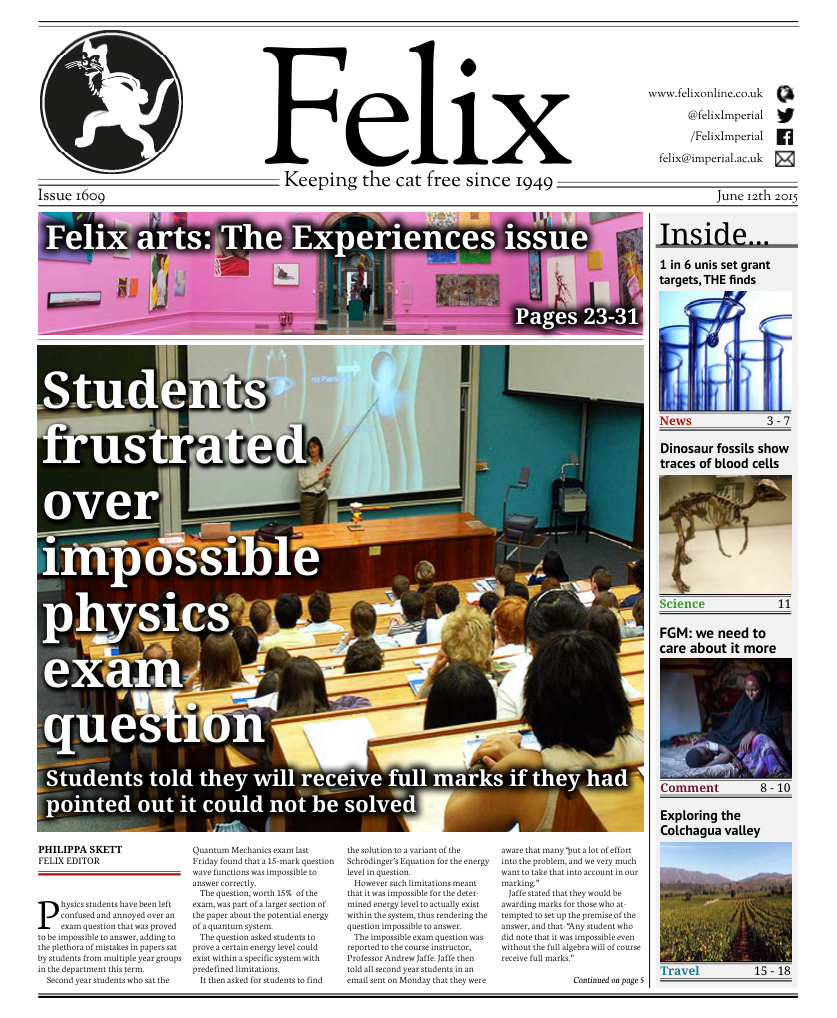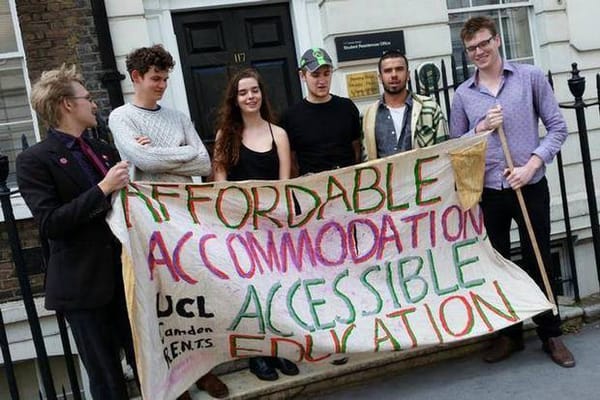Students frustrated over impossible physics exam question
Students have been told they will receive full marks if they had pointed out it could not be solved, reports Philippa Skett

Physics students have been left confused and annoyed over an exam question that was proved to be impossible to answer, adding to the plethora of mistakes in papers sat by students from multiple year groups in the department this term.
Second year students who sat the Quantum Mechanics exam last Friday found that a 15-mark question wave functions was impossible to answer correctly.
The question, worth 15% of the exam, was part of a larger section of the paper about the potential energy of a quantum system.
The question asked students to prove a certain energy level could exist within a specific system with predefined limitations.
It then asked for students to find the solution to a variant of the Schrödinger’s Equation for the energy level in question.
However such limitations meant that it was impossible for the determined energy level to actually exist within the system, thus rendering the question impossible to answer.
The impossible exam question was reported to the course instructor, Professor Andrew Jaffe. Jaffe then told all second year students in an email sent on Monday that they were aware that many “put a lot of effort into the problem, and we very much want to take that into account in our marking.”
Jaffe stated that they would be awarding marks for those who attempted to set up the premise of the answer, and that: “Any student who did note that it was impossible even without the full algebra will of course receive full marks.”
Jaffe also told Felix that he wished “to apologise for the error,” and promised, “We will ensure that the exam is marked fairly.”
The senior tutor for the Physics department also offered his apologies for the errors within the exam in the same email.
Speaking to one student, they told Felix how classmates were feeling disappointed that exams are being checked “so poorly’” and that some also feel they have been “lied to by the department regarding the quality of proofreading.”
Said another student: “I’ve now sat two consecutive exams that have been riddled with errors, both needing several corrections mid-exam, which is detrimental to students being able to focus.
“The Quantum Mechanics exam contained several typographical errors, driving some students to disbelieving laughter as more and more corrections had to be explained to the cohort.
“The Imperial physics department yet again shows how much they care about research over the students.”
One student was keen to point out that this may not be the fault of just one individual. They told Felix: “Andrew Jaffe is a very competent lecturer, and was very apologetic about the whole situation.
“I can understand that sometimes it’s hard to see errors in your own work, and think that this is a problem with the system rather than with the lecturer.”
Another remained pessimistic, stating: “The department doesn’t really care too much for student welfare anyway so other than feeling embarrassed as a whole it probably won’t do anything regardless of student consensus.”
Said another: “The mistake was completely unacceptable; it could have been avoided if a single person had attempted to do the question.”
This has not been the only issue with exams for Physics undergraduates this term; a Physics undergraduate representative made a “formal complaint” via email to the Head of the Physics department, Jordan Nash, on the “unacceptably poor nature” of the Comprehensive paper that was sat earlier on in term, on the 6th of May.
The email complaint stated how the Comprehensive paper “contained no fewer than three large errors,” which were spotted and corrected mid-exam.
These errors included a missing power function in an equation that students were required to prove, and a set of constraints about pressure in a system that were incorrect.
Dr. Bob Forsyth, the Director of Undergraduate studies, responded to the formal complaint, stating that he had confirmed with the Chair of the Comprehensive exam panel that the paper had passed through all of the checking stages, including the script being sent to an external examiner beforehand.
Said Forsyth in his response: “The errors on this paper were taken very seriously by the examiners during the exam, and all efforts have been made in the marking to ensure that no student has suffered in their result due to the typographical errors.”
He concluded that also it would be impossible to guarantee every exam paper in the future will be 100% error free, but he agreed that exam errors should be an exception.
He assured the representative that he would raise the general issue at a Teaching Committee meeting in the future.
Forsyth also told Felix: “I would like to take this opportunity to reassure all students that, where errors have occurred, our examiners do everything possible to ensure that no students are disadvantaged in their results.”
Two Comprehensive exams are sat in third year, and together they are worth a third of the year’s weighting overall. The exams cover all topics taught in both second and first year.
Over the term, there has been a reported total of 17 issues across various exams, affecting modules across all year groups. Issues have reportedly included poor quality images being difficult to decipher, incorrect units and potential energy values, and various typos.
An accumulation of mistakes resulted in the complaints being relayed to the Faculty of Natural Sciences Teaching staff. Third year representative Ben Fernando met with the staff Monday morning.
In an email to the rest of his year group, Fernando stated that the staff will be conducting an investigation into the examination errors, and that “they have promised a speedy response.”
Said Fernando: “I am inclined not to pass comment but in the interests of transparency I can confirm that my actions as year rep included sending a number of emails to the department staff, both before and after exams, highlighting concerns about procedure.
As there were a significant number that received no reply the issue was raised to a faculty level. I am led to believe an investigation is on-going and I’ve made the department aware of at least 17 errors or issues with examinations papers affecting 10 papers.”
This follows mistakes being made in an assessed problem sheet and a maths revision test sat at the beginning of the year, which after being highlighted to the department by students, were initially deemed too insignificant to be rectified.
Second year students were told to “take it on the chin…it’s a drop in the ocean,” by a senior teaching fellow, which caused further complaints.
The Department of Physics was ranked 8th overall in the UK in the recent Guardian League table, although came in at 27th when ranked according to overall student satisfaction.










